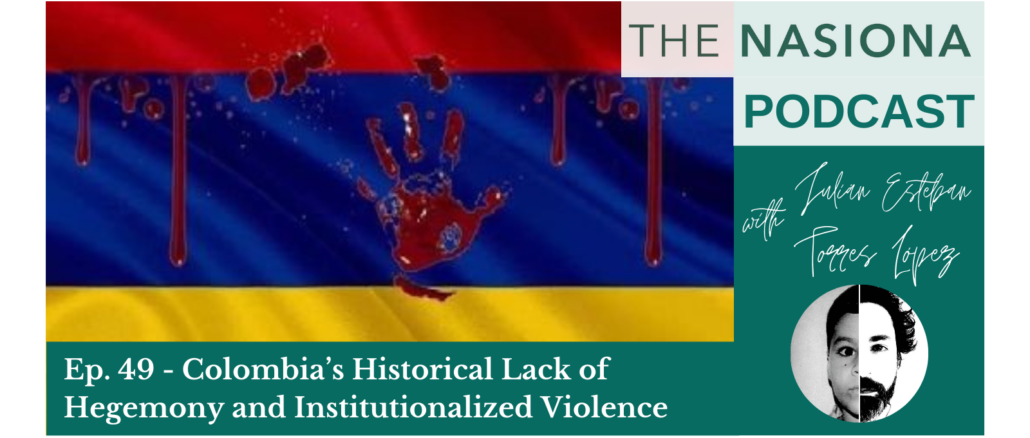
You can also find our podcast episodes on Apple Podcasts, Spotify, iHeartRadio, Stitcher, or wherever you get your podcasts.
Colombia’s history is marked with many of its people treated merely as a mean to an end. Laura Yusem and Herbert Braun, respectively, were right in recognizing that “In Latin America, we learn early that our lives are worth little” and that “[i]n the struggle for land, human life in Colombia has been devalued.” Human rights activist Manuel Rozental was correct to paint Colombia’s history with the following pattern: people are massacred or enslaved, displaced, the land is freed, and the élite, foreign powers, and multi-national corporations come in to exploit the land and the labor force.
What is going on today, during the Great Colombian Uprising of 2021, is an extension of this history.
On today’s episode, I read an essay from my book, Reporting on Colombia: Essays on Colombia’s History, Culture, Peoples, and Armed Conflict, which dissects Colombia’s historical lack of hegemony and institutionalized violence to give you 200 years of context (through the early 1990s) of what systemic, structural, institutional, policy, and cultural conditions, along with what actors and situations, have led to the current Great Colombian Uprising, which goes beyond this year’s proposed tax reform.
Today, Colombia and the Colombian people are in crisis. The Colombian government is killing, torturing, disappearing, and sexually assaulting Colombian people on the streets throughout the country. Our hearts are heavy and in pain. We need your help. Please don’t look away.
To help Colombia and Colombians:
Julián Esteban Torres López (he/him/his/él) is a bilingual, Colombia-born culture architect with Afro-Euro-Indigenous roots. For two decades, Julián has studied systems of oppression and has worked toward humanizing those who have been socially, politically, and geographically excluded from the hierarchies of power by centering, elevating, and amplifying their voices, experiences, and histories. He is the founder of the social justice storytelling movement The Nasiona, where he also hosts and produces The Nasiona Podcast. He’s a Pushcart Prize and Best Small Fictions nominee, a Trilogy Award in Short Fiction finalist, and the author of Marx’s Humanism and Its Limits and Reporting On Colombia. His poetry collection, Ninety-Two Surgically Enhanced Mannequins, is available now. His work appears in PANK Magazine, Into the Void Magazine, The Acentos Review, Novus Literary Arts Journal, Havic 2021: Inside Brilliance, among others. Julián holds a bachelor’s in philosophy and in communication and a master’s in justice studies from the University of New Hampshire and was a Ph.D. candidate at the University of British Columbia Okanagan, where he focused on political science and Latin American studies.
The Nasiona Podcast amplifies the voices and experiences of the marginalized, undervalued, overlooked, silenced, and forgotten, as well as gives you a glimpse into Othered worlds. We focus on stories that explore the spectrum of human experiences—stories based on facts, truth-seeking, human concerns, real events, and real people, with a personal touch. From liminal lives to the marginalized, and everything in between, we believe that the subjective can offer its own reality and reveal truths some facts can’t discover. Hosted, edited, and produced by Julián Esteban Torres López.
Please follow The Nasiona on Twitter, Instagram, and Facebook for regular updates: @TheNasiona
Original music for The Nasiona Podcast was produced by the Grammy Award-winning team of Joe Sparkman and Marcus Allen, aka The Heavyweights.
Joe Sparkman: Twitter + Instagram. Marcus Allen: Twitter + Instagram.The Nasiona Magazine and Podcast depend on voluntary contributions from readers and listeners like you. We hope the value of our work to our community is worth your patronage. If you like what we do, please show this by liking, rating, and reviewing us; buying or recommending our books; and by financially supporting our work either through The Nasiona’s Patreon page or through Julián Esteban Torres López‘s Ko-fi donation platform. Every little bit helps.
Thank you for listening and reading, and thank you for your support.




3 Trackbacks / Pingbacks
Comments are closed.